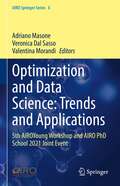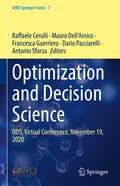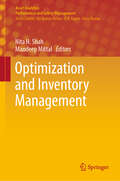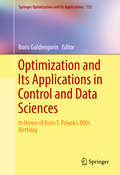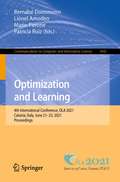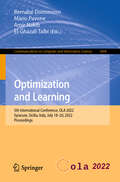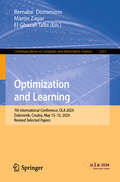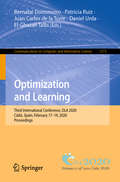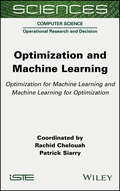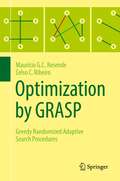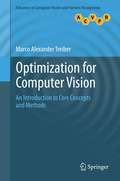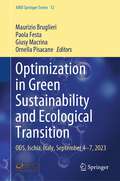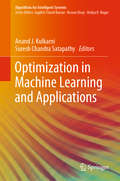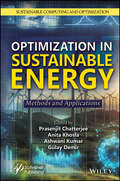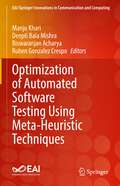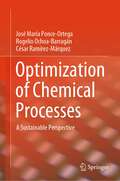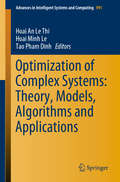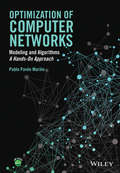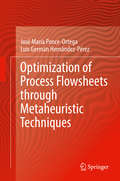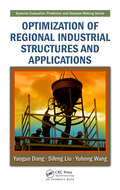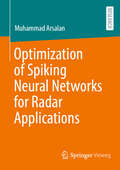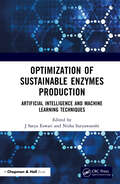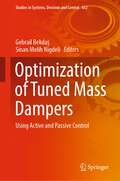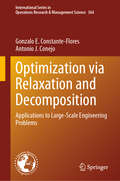- Table View
- List View
Optimization and Data Science: 5th AIROYoung Workshop and AIRO PhD School 2021 Joint Event (AIRO Springer Series #6)
by Adriano Masone Veronica Dal Sasso Valentina MorandiThis proceedings volume collects contributions from the 5th AIRO Young Workshop and AIRO PhD School 2021 joint event on “Optimization and Data Science: Trends and Applications”, held online, from February 8 to 12, 2021. The joint event was organized by AIROYoung representatives and the Operations Research Group of the Department of Electrical Engineering and Information Technology of the University “Federico II” of Naples.The selected contributions represent the state-of-the-art knowledge related to different branches of research, such as data science, machine learning and combinatorial optimization. Therefore, this book is primarily addressed to researchers and PhD students of the operations research community. However, due to its interdisciplinary content, it will be of high interest for other closely related research communities. Moreover, this volume not only presents theoretical results but also covers real applications in computer science, engineering, economics, healthcare, and logistics, making it interesting for practitioners facing complex decision-making problems in these areas.
Optimization and Decision Science: ODS, Virtual Conference, November 19, 2020 (AIRO Springer Series #7)
by Dario Pacciarelli Antonio Sforza Raffaele Cerulli Mauro Dell’Amico Francesca GuerrieroThis book collects selected contributions from the international conference “Optimization and Decision Science” (ODS2020), which was held online on November 19, 2020, and organized by AIRO, the Italian Operations Research Society. The book offers new and original contributions on optimization, decisions science and prescriptive analytics from both a methodological and applied perspective, using models and methods based on continuous and discrete optimization, graph theory and network optimization, analytics, multiple criteria decision making, heuristics, metaheuristics, and exact methods.In addition to more theoretical contributions, the book chapters describe models and methods for addressing a wide diversity of real-world applications, spanning health, transportation, logistics, public sector, manufacturing, and emergency management.Although the book is aimed primarily at researchers and PhD students in the Operations Research community, the interdisciplinary content makes it interesting for practitioners facing complex decision-making problems in the afore-mentioned areas, as well as for scholars and researchers from other disciplines, including artificial intelligence, computer sciences, economics, mathematics, and engineering.
Optimization and Inventory Management (Asset Analytics)
by Nita H. Shah Mandeep MittalThis book discusses inventory models for determining optimal ordering policies using various optimization techniques, genetic algorithms, and data mining concepts. It also provides sensitivity analyses for the models’ robustness. It presents a collection of mathematical models that deal with real industry scenarios. All mathematical model solutions are provided with the help of various optimization techniques to determine optimal ordering policy. The book offers a range of perspectives on the implementation of optimization techniques, inflation, trade credit financing, fuzzy systems, human error, learning in production, inspection, green supply chains, closed supply chains, reworks, game theory approaches, genetic algorithms, and data mining, as well as research on big data applications for inventory management and control. Starting from deterministic inventory models, the book moves towards advanced inventory models. The content is divided into eight major sections: inventory control and management – inventory models with trade credit financing for imperfect quality items; environmental impact on ordering policies; impact of learning on the supply chain models; EOQ models considering warehousing; optimal ordering policies with data mining and PSO techniques; supply chain models in fuzzy environments; optimal production models for multi-items and multi-retailers; and a marketing model to understand buying behaviour. Given its scope, the book offers a valuable resource for practitioners, instructors, students and researchers alike. It also offers essential insights to help retailers/managers improve business functions and make more accurate and realistic decisions.
Optimization and Its Applications in Control and Data Sciences
by Boris GoldengorinThis book focuses on recent research in modern optimization and its implications in control and data analysis. This book is a collection of papers from the conference "Optimization and Its Applications in Control and Data Science" dedicated to Professor Boris T. Polyak, which was held in Moscow, Russia on May 13-15, 2015. This book reflects developments in theory and applications rooted by Professor Polyak's fundamental contributions to constrained and unconstrained optimization, differentiable and nonsmooth functions, control theory and approximation. Each paper focuses on techniques for solving complex optimization problems in different application areas and recent developments in optimization theory and methods. Open problems in optimization, game theory and control theory are included in this collection which will interest engineers and researchers working with efficient algorithms and software for solving optimization problems in market and data analysis. Theoreticians in operations research, applied mathematics, algorithm design, artificial intelligence, machine learning, and software engineering will find this book useful and graduate students will find the state-of-the-art research valuable.
Optimization and Learning: 4th International Conference, OLA 2021, Catania, Italy, June 21-23, 2021, Proceedings (Communications in Computer and Information Science #1443)
by Lionel Amodeo Bernabé Dorronsoro Patricia Ruiz Mario PavoneThis volume constitutes the refereed proceedings of the 4th International Conference on Optimization and Learning, OLA 2021, held in Catania, Italy, in June 2021. Due to the COVID-19 pandemic the conference was held online. The 27 full papers were carefully reviewed and selected from 62 submissions. The papers presented in the volume are organized in topical sections on synergies between optimization and learning; learning for optimization; machine learning and deep learning; transportation and logistics; optimization; applications of learning and optimization methods.
Optimization and Learning: 5th International Conference, OLA 2022, Syracuse, Sicilia, Italy, July 18–20, 2022, Proceedings (Communications in Computer and Information Science #1684)
by Bernabé Dorronsoro Mario Pavone El-Ghazali Talbi Amir NakibThis book constitutes the refereed proceedings of the 5th International Conference on Optimization and Learning, OLA 2022, which took place in Syracuse, Sicilia, Italy, in July 2022. The 19 full papers presented in this volume were carefully reviewed and selected from 52 submissions. The papers are organized in the following topical sections: Optimization and Learning; Novel Optimization Techniques; Logistics; and Applications.
Optimization and Learning: 7th International Conference, OLA 2024, Dubrovnik, Croatia, May 13–15, 2024, Revised Selected Papers (Communications in Computer and Information Science #2311)
by Bernabé Dorronsoro El-Ghazali Talbi Martin ZagarThis book constitutes the refereed proceedings of the 7th International Conference on Optimization and Learning, OLA 2024, held in Dubrovnik, Croatia, during May 13–15, 2024. The 24 full papers presented here were carefully reviewed and selected from 64 submissions. They were organized in the following topical sections: synergies between optimization and machine learning; enhancing optimization and learning techniques; transportation and routing; and applications.
Optimization and Learning: Third International Conference, OLA 2020, Cádiz, Spain, February 17–19, 2020, Proceedings (Communications in Computer and Information Science #1173)
by Bernabé Dorronsoro Patricia Ruiz El-Ghazali Talbi Juan Carlos de la Torre Daniel UrdaThis volume constitutes the refereed proceedings of the Third International Conference on Optimization and Learning, OLA 2020, held in Cádiz, Spain, in February 2020. The 23 full papers were carefully reviewed and selected from 55 submissions. The papers presented in the volume focus on the future challenges of optimization and learning methods, identifying and exploiting their synergies,and analyzing their applications in different fields, such as health, industry 4.0, games, logistics, etc.
Optimization and Machine Learning: Optimization for Machine Learning and Machine Learning for Optimization
by Patrick Siarry Rachid ChelouahMachine learning and optimization techniques are revolutionizing our world. Other types of information technology have not progressed as rapidly in recent years, in terms of real impact. The aim of this book is to present some of the innovative techniques in the field of optimization and machine learning, and to demonstrate how to apply them in the fields of engineering.Optimization and Machine Learning presents modern advances in the selection, configuration and engineering of algorithms that rely on machine learning and optimization. The first part of the book is dedicated to applications where optimization plays a major role, and the second part describes and implements several applications that are mainly based on machine learning techniques. The methods addressed in these chapters are compared against their competitors, and their effectiveness in their chosen field of application is illustrated.
Optimization by GRASP: Greedy Randomized Adaptive Search Procedures
by Celso C. Ribeiro Mauricio G.C. ResendeThis is the first book to cover GRASP (Greedy Randomized Adaptive Search Procedures), a metaheuristic that has enjoyed wide success in practice with a broad range of applications to real-world combinatorial optimization problems. The state-of-the-art coverage and carefully crafted pedagogical style lends this book highly accessible as an introductory text not only to GRASP, but also to combinatorial optimization, greedy algorithms, local search, and path-relinking, as well as to heuristics and metaheuristics, in general. The focus is on algorithmic and computational aspects of applied optimization with GRASP with emphasis given to the end-user, providing sufficient information on the broad spectrum of advances in applied optimization with GRASP. For the more advanced reader, chapters on hybridization with path-relinking and parallel and continuous GRASP present these topics in a clear and concise fashion. Additionally, the book offers a very complete annotated bibliography of GRASP and combinatorial optimization. For the practitioner who needs to solve combinatorial optimization problems, the book provides a chapter with four case studies and implementable templates for all algorithms covered in the text. This book, with its excellent overview of GRASP, will appeal to researchers and practitioners of combinatorial optimization who have a need to find optimal or near optimal solutions to hard combinatorial optimization problems.
Optimization for Computer Vision: An Introduction to Core Concepts and Methods
by Marco Alexander TreiberThis practical and authoritative text/reference presents a broad introduction to the optimization methods used specifically in computer vision. In order to facilitate understanding, the presentation of the methods is supplemented by simple flow charts, followed by pseudocode implementations that reveal deeper insights into their mode of operation. These discussions are further supported by examples taken from important applications in computer vision. Topics and features: provides a comprehensive overview of computer vision-related optimization; covers a range of techniques from classical iterative multidimensional optimization to cutting-edge topics of graph cuts and GPU-suited total variation-based optimization; describes in detail the optimization methods employed in computer vision applications; illuminates key concepts with clearly written and step-by-step explanations; presents detailed information on implementation, including pseudocode for most methods.
Optimization in Green Sustainability and Ecological Transition: ODS, Ischia, Italy, September 4–7, 2023 (AIRO Springer Series #12)
by Paola Festa Maurizio Bruglieri Giusy Macrina Ornella PisacaneThis book collects selected contributions of the “Optimization and Decision Science - ODS2023” international conference on the theme of optimization in green sustainability and ecological transition. ODS2023 was held in Ischia, 4–7 September 2023, and was organized by AIRO, the Italian Operations Research Society. The book offers new and original contributions on operations research, optimization, decision science, and prescriptive analytics from both a methodological and applied perspectives with a special focus on SDG related topics.It provides a state-of-the art on problem models and solving methods to address a widely class of real-world problems, arising in different application areas such as logistics, transportation, manufacturing, health, ICT and mobile networks, and emergency/disaster management. In addition, the scientific works collected in this book aim at providing significant contributions in the themes of sustainability, traffic and pollution reductions, and energy management.This book is aimed primarily at researchers and Ph.D. students in the Operations Research community. However, due to its interdisciplinary contents, this book is of high interest also for students and researchers from other disciplines, including artificial intelligence, computer sciences, finance, mathematics, and engineering as well as for practitioners facing complex decision-making problems in logistics, manufacturing production, and services.
Optimization in Machine Learning and Applications (Algorithms for Intelligent Systems)
by Suresh Chandra Satapathy Anand J. KulkarniThis book discusses one of the major applications of artificial intelligence: the use of machine learning to extract useful information from multimodal data. It discusses the optimization methods that help minimize the error in developing patterns and classifications, which further helps improve prediction and decision-making. The book also presents formulations of real-world machine learning problems, and discusses AI solution methodologies as standalone or hybrid approaches. Lastly, it proposes novel metaheuristic methods to solve complex machine learning problems. Featuring valuable insights, the book helps readers explore new avenues leading toward multidisciplinary research discussions.
Optimization in Practice with MATLAB® for Engineering Students and Professionals
by Achille MessacOptimization in Practice with MATLAB® provides a unique approach to optimization education. It is accessible to both junior and senior undergraduate and graduate students, as well as industry practitioners. It provides a strongly practical perspective that allows the student to be ready to use optimization in the workplace. It covers traditional materials, as well as important topics previously unavailable in optimization books (e. g. , Numerical Essentials - for successful optimization). Written with both the reader and the instructor in mind, Optimization in Practice with MATLAB® provides practical applications of real-world problems using MATLAB®, with a suite of practical examples and exercises that help the students link the theoretical, the analytical, and the computational in each chapter. Additionally, supporting MATLAB® m-files are available for download via www. cambridge. org. messac. Lastly, adopting instructors will receive a comprehensive solution manual with solution codes along with lectures in PowerPoint with animations for each chapter, and the text's unique flexibility enables instructors to structure one- or two-semester courses.
Optimization in Sustainable Energy: Methods and Applications (Sustainable Computing and Optimization)
by Ashwani Kumar Prasenjit Chatterjee Anita Khosla G Lay DemirThis state-of-the-art book offers cutting-edge optimization techniques and practical decision-making frameworks essential for enhancing the efficiency and reliability of sustainable energy systems, making it an invaluable resource for researchers, policymakers, and energy professionals. Optimization in Sustainable Energy: Methods and Applications brings together valuable knowledge, methods, and practical examples to help scholars, researchers, professionals, and policymakers address the growing challenges of optimizing sustainable energy. This volume covers a range of topics, including mathematical models, heuristic algorithms, renewable resource management, and energy storage optimization. Each chapter explores a different aspect of sustainable energy, providing both theoretical understanding and practical guidance. The volume explores challenges and opportunities surrounding the integration of multi-criteria decision-making techniques in energy planning, highlighting insights on environmental, economic, and social factors influencing the strategic allocation of resources. The use of evolutionary algorithms, machine learning, and metaheuristics to optimize energy storage, distribution, and optimization are also discussed. The transition towards sustainable energy is at the forefront of global priorities, driven by the urgent need to mitigate climate change, reduce carbon emissions, and enhance energy security. As countries and industries increasingly prioritize renewable sources like wind, solar, and hydroelectric power, the complexity of optimizing these systems becomes a critical challenge. Optimization in Sustainable Energy: Methods and Applications, is a comprehensive exploration of cutting-edge methodologies used to enhance the efficiency, reliability, and performance of sustainable energy systems. Audience Research scholars, academics, students, policymakers, and industry experts in mechanical engineering, electrical engineering, and energy science.
Optimization of Automated Software Testing Using Meta-Heuristic Techniques (EAI/Springer Innovations in Communication and Computing)
by Manju Khari Biswaranjan Acharya Ruben Gonzalez Crespo Deepti Bala MishraThis book provides awareness of different evolutionary methods used for automatic generation and optimization of test data in the field of software testing. While the book highlights on the foundations of software testing techniques, it also focuses on contemporary topics for research and development. This book covers the automated process of testing in different levels like unit level, integration level, performance level, evaluation of testing strategies, testing in security level, optimizing test cases using various algorithms, and controlling and monitoring the testing process etc. This book aids young researchers in the field of optimization of automated software testing, provides academics with knowledge on the emerging field of AI in software development, and supports universities, research centers, and industries in new projects using AI in software testing.Supports the advancement in the artificial intelligence used in software development;Advances knowledge on artificial intelligence based metaheuristic approach in software testing;Encourages innovation in traditional software testing field using recent artificial intelligence.·
Optimization of Chemical Processes: A Sustainable Perspective
by José María Ponce-Ortega Rogelio Ochoa-Barragán César Ramírez-MárquezThis textbook introduces readers to a comprehensive framework for the application of deterministic optimization strategies in the field of chemical processes, with a strong emphasis on sustainability.The book establishes a vital connection between fundamental deterministic optimization principles, optimization tools, and real-world application instances, all within the context of environmentally responsible practices. The approach put forth in this book is exceptionally versatile, allowing for the use of many optimization software and deterministic techniques.Contained in the book are many fundamental optimization concepts, encompassing linear programming, nonlinear programming, integer programming, and multi-objective optimization, all tailored to promote sustainable decision-making. Furthermore, the book provides practical examples illustrating the application of these techniques within sustainable chemical processes as tutorials.The textbook also explores the utilization of popular optimization software platforms such as GAMS, MATLAB, and Python, demonstrating how these tools can be leveraged for eco-friendly process optimization. Through this comprehensive framework, readers can not only acquire the skills needed to optimize a wide range of processes but also learn how to do so with sustainability at the forefront of their considerations. This approach streamlines the optimization process, eliminating unnecessary complications along the way and ensuring that environmental and ethical considerations are integral to the decision-making process.
Optimization of Complex Systems: Theory, Models, Algorithms and Applications (Advances in Intelligent Systems and Computing #991)
by Hoai An Le Thi Hoai Minh Le Tao Pham DinhThis book contains 112 papers selected from about 250 submissions to the 6th World Congress on Global Optimization (WCGO 2019) which takes place on July 8–10, 2019 at University of Lorraine, Metz, France. The book covers both theoretical and algorithmic aspects of Nonconvex Optimization, as well as its applications to modeling and solving decision problems in various domains. It is composed of 10 parts, each of them deals with either the theory and/or methods in a branch of optimization such as Continuous optimization, DC Programming and DCA, Discrete optimization & Network optimization, Multiobjective programming, Optimization under uncertainty, or models and optimization methods in a specific application area including Data science, Economics & Finance, Energy & Water management, Engineering systems, Transportation, Logistics, Resource allocation & Production management. The researchers and practitioners working in Nonconvex Optimization and several application areas can find here many inspiring ideas and useful tools & techniques for their works.
Optimization of Computer Networks: A Hands-On Approach
by Pablo Pavón MariñoThis book covers the design and optimization of computer networks applying a rigorous optimization methodology, applicable to any network technology. It is organized into two parts. In Part 1 the reader will learn how to model network problems appearing in computer networks as optimization programs, and use optimization theory to give insights on them. Four problem types are addressed systematically - traffic routing, capacity dimensioning, congestion control and topology design. Part 2 targets the design of algorithms that solve network problems like the ones modeled in Part 1. Two main approaches are addressed - gradient-like algorithms inspiring distributed network protocols that dynamically adapt to the network, or cross-layer schemes that coordinate the cooperation among protocols; and those focusing on the design of heuristic algorithms for long term static network design and planning problems. Following a hands-on approach, the reader will have access to a large set of examples in real-life technologies like IP, wireless and optical networks. Implementations of models and algorithms will be available in the open-source Net2Plan tool from which the user will be able to see how the lessons learned take real form in algorithms, and reuse or execute them to obtain numerical solutions. An accompanying link to the author's own Net2plan software enables readers to produce numerical solutions to a multitude of real-life problems in computer networks (www.net2plan.com).
Optimization of Process Flowsheets through Metaheuristic Techniques
by José María Ponce-Ortega Luis Germán Hernández-PérezThis textbook presents a general multi-objective optimization framework for optimizing chemical processes by implementing a link between process simulators and metaheuristic techniques. The proposed approach is general and shows how to implement links between different process simulators such as Aspen Plus®, HYSIS®, Super Pro Designer® linked to a variety of metaheuristic techniques implemented in Matlab®, Excel®, C++, and others, eliminating the numerical complications through the optimization process. Furthermore, the proposed framework allows the use of thermodynamic, design and constitutive equations implemented in the process simulator to implement any process. Aimed at graduate and undergraduate students, it presents introductory chapters for process simulators and metaheuristic optimization techniques and provides several worked exercises as well as proposed exercises. In addition, accompanying tutorial videos clearly explaining the implemented methodologies are available online. Also, some Matlab® routines are included as electronic supporting material.
Optimization of Regional Industrial Structures and Applications (Systems Evaluation, Prediction, and Decision-Making)
by Sifeng Liu Yaoguo Dang Yuhong WangBased on research projects supported by the National Natural Science Foundation of China and Nanjing University of Aeronautics and Astronautics, Optimization of Regional Industrial Structures and Applications provides an authoritative introduction to and survey of the cutting-edge research and applications in industrial structure optimization. Empl
Optimization of Spiking Neural Networks for Radar Applications
by Muhammad ArsalanThis book offers a comprehensive exploration of the transformative role that edge devices play in advancing Internet of Things (IoT) applications. By providing real-time processing, reduced latency, increased efficiency, improved security, and scalability, edge devices are at the forefront of enabling IoT growth and success. As the adoption of AI on the edge continues to surge, the demand for real-time data processing is escalating, driving innovation in AI and fostering the development of cutting-edge applications and use cases. Delving into the intricacies of traditional deep neural network (deepNet) approaches, the book addresses concerns about their energy efficiency during inference, particularly for edge devices. The energy consumption of deepNets, largely attributed to Multiply-accumulate (MAC) operations between layers, is scrutinized. Researchers are actively working on reducing energy consumption through strategies such as tiny networks, pruning approaches, and weight quantization. Additionally, the book sheds light on the challenges posed by the physical size of AI accelerators for edge devices. The central focus of the book is an in-depth examination of SNNs' capabilities in radar data processing, featuring the development of optimized algorithms.
Optimization of Sustainable Enzymes Production: Artificial Intelligence and Machine Learning Techniques
by J. Satya Eswari Nisha SuryawanshiThis book is designed as a reference book and presents a systematic approach to analyze evolutionary and nature-inspired population-based search algorithms. Beginning with an introduction to optimization methods and algorithms and various enzymes, the book then moves on to provide a unified framework of process optimization for enzymes with various algorithms. The book presents current research on various applications of machine learning and discusses optimization techniques to solve real-life problems. •The book compiles the different machine learning models for optimization of process parameters for production of industrially important enzymes. The production and optimization of various enzymes produced by different microorganisms are elaborated in the book. •It discusses the optimization methods that help minimize the error in developing patterns and classifications, which further helps improve prediction and decision-making. •Covers the best-performing methods and approaches for optimization sustainable enzymes production with AI integration in a real-time environment. •Featuring valuable insights, the book helps readers explore new avenues leading towards multidisciplinary research discussions. The book is aimed primarily at advanced undergraduates and graduates studying machine learning, data science and industrial biotechnology. Researchers and professionals will also find this book useful.
Optimization of Tuned Mass Dampers: Using Active and Passive Control (Studies in Systems, Decision and Control #432)
by Gebrail Bekdaş Sinan Melih NigdeliThis book is a timely book to summarize the latest developments in the optimization of tuned mass dampers covering all classical approaches and new trends including metaheuristic algorithms. Also, artificial intelligence and machine learning methods are included to predict optimum results by skipping long optimization processes. Another difference and advantage of the book are to provide chapters about several types of control types including passive tuned mass dampers, active tuned mass dampers, tuned liquid dampers, tuned liquid column dampers and inerter dampers. Tuned mass dampers (TMDs) are vibration absorber devices used in all types of mechanic systems. The key factor in the design is an effective tuning of TMDs for the desired performance. In practice, several high-rise structures and bridges were designed by including TMDs. Also, TMDs were installed after the construction of the structures after several negative experiences resulting from the disturbing sway of the structures. In optimum design, several closed-form expressions have been proposed for optimum frequency and damping ratio of TMDs, but the exact optimization requires iterative optimization approaches. The current trend is to use evolutionary algorithms and metaheuristic optimization methods to reach the goal.
Optimization via Relaxation and Decomposition: Applications to Large-Scale Engineering Problems (International Series in Operations Research & Management Science #364)
by Antonio J. Conejo Gonzalo E. Constante-FloresThis book offers an up-to-date description of relaxation/approximation and decomposition techniques, demonstrating how their combined use efficiently solves large-scale optimization problems relevant to engineering, particularly in electrical, and industrial engineering, with a focus on energy. Specifically, it presents linear and nonlinear relaxations and approximations that are relevant to optimization problems, introduces complicating constraints and complicating variables decomposition techniques that can take advantage of relaxations and approximations, and examines their applications in the engineering field. Written in an accessible engineering language and filled with numerous illustrative examples and end-of-chapter exercises for all chapters, this book is a valuable resource for advanced undergraduate and graduate students, researchers, and practitioners in power engineering and industrial engineering. Moreover, business students with a keen interest in decision-making problems will also benefit greatly from its practical insights.
